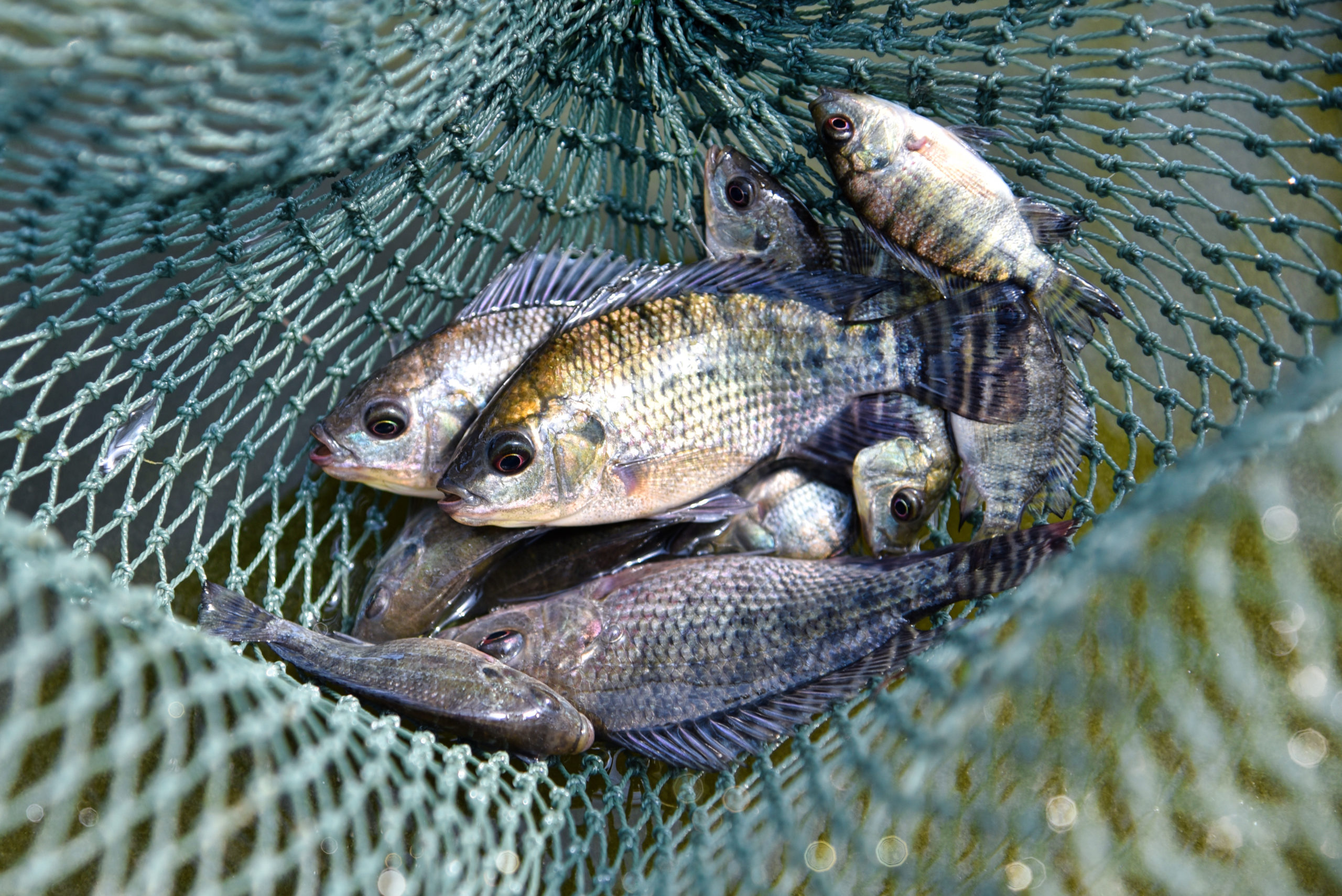Supporting the development of a sustainable and resilient aquaculture sector in Africa
In this article of our ‘Focus on’ series, we delve into the sustainable aquaculture innovations of three Agrifood Africa Connect Innovation Awards. Discover innovations to increase the sustainability and reduce the cost of aquaculture feed in Africa.
The need: Focusing on aquaculture for sustainable AgriFood systems
Over the last five decades, aquaculture has emerged as a key contributor to food security in Africa, providing sustainable and nutritious food for expanding populations. The sector is currently buoyed by increasing demand and is attracting new investments, signalling a promising future.
However, the high cost and availability of fish feed is a significant challenge in African aquaculture. For example, when producing tilapia in Ghana, feed amounts to anywhere between 60-80% of production costs. There is a pressing need for the industry to adopt more efficient, shorter supply chains (particularly in rural areas) that can deliver more sustainable, affordable, and nutritious feed solutions.
Learn more about the landscape, challenges and opportunities for African aquaculture.

The solutions: AgriFood Africa Connect Innovation Awards aquaculture case studies
Reducing costs and enhancing self-sufficiency in feed supply chains is essential to ensuring the sustainable growth and resilience of the aquaculture sector.
AgriFood Africa Connect Innovation Awards have focused on developing more affordable and accessible feed for tilapia – one of the most widely farmed species – to improve small-scale farmers’ profitability.
-
LarvaeLive: Direct feeding trials of Black Soldier Fly larvae in Ugandan tilapia farms
Unlike conventional black soldier fly (BSF) industry practices, which focus on feed ingredient replacement, this project sought to leverage BSF larvae (BSFL) as a direct alternative to prohibitively expensive commercial feeds to enhance tilapia nutrition and farmer self-sufficiency.
Tim Messeder from Rural Aquaculture Development (RAD), a fish farm and one stop shop for aquaculture producers in Uganda, partnered with Anton Immink from ThinkAqua to investigate the viability of using BSFL in pond-based tilapia feeding trials. This collaboration extended to developing a business model centred on BSFL production, offering successful training for ~50 local farmers on cultivating their own BSFL feed.
The trials demonstrated that tilapia grew just as well when commercial feed pellets were replaced with BSFL. The project proved the feasibility and sustainability of producing BSFL using organic waste from local markets. To support fish farmers in adopting this method, RAD are now breeding and selling newly hatched BSFL for use as feed. Moreover, the BSFL also produce excrement or ‘frass’, which farmers can use as a cost-effective fertiliser, another farming input that has drastically increased in price.
Future opportunities:
- Broadening the pond-based BSFL-fed tilapia business model to other regions.
- Improving tilapia genetics to offer farmers access to higher quality fingerlings.
-
Towards a sustainable solution for aquafeed: using live yellow mealworm larvae grown on pre-consumer wastes for tilapia culture in Malawi
This collaborative project, led by Amina Moss at the University of Stirling and Dr Kumbukani Mzengereza at Mzuzu University, explored the use of live yellow mealworm larvae, raised on pre-consumer organic waste, as an innovative feed for tilapia in Malawi.
Where previous studies focused on using plant-based feed, insects offer a viable, cost-effective alternative, and more complete protein source. This initiative provided the added benefit of reducing waste through a circular economy model, in which the larvae were fed on food waste such as carrot trimmings.
In an eight-week trial, the results indicated that two tilapia species, fed on diets incorporating 20% substitution of fish-meal with yellow mealworms, showed growth rates comparable to those on conventional fishmeal-based diets. These promising results show that cost-effective and sustainable yellow mealworms could be a feasible alternative in tilapia aquaculture feeds in Malawi without compromising the growth performance or health of the fish.
Future opportunities:
- Addressing challenges posed by a lack of machinery, which could hinder the scaling of insect feed production in Africa.
-
Development of a solar-powered manufacturing unit for fish-feed, using insects, local crops, and farming residues
The success of fish farming in low-income countries can be enhanced by the availability of locally produced fish feed ingredients as imported alternatives can be prohibitively expensive. Making machinery that can efficiently process insects into animal feed could offer the potential to expand the use of more cost-effective insect-based feeds.
Dr Marcelo Precoppe from the University of Greenwich, along with Emmastella Gakuo and the engineering team at Savanna Circuit Technologies Ltd. in Kenya, designed a solar-powered, multipurpose hammermill that can pound fresh ingredients into a mash. A solar-powered pelleting machine was also designed and prototyped to turn the dried powders into feed pellets.
The project’s participatory approach ensured the machinery was tailored to the community’s needs, reducing barriers to adopting the new technology. Now, with access to locally produced fish feed, farmers can produce fish efficiently at optimal stocking densities while remaining profitable and enhancing the local supply of safe, affordable and nutritious food.
Future opportunities:
- Integrating solar drying into the production process to ensure the creation of high-quality pellets and improve the final product.
Discover more about our impact
With 86 Innovate UK AgriFood Africa Connect Innovation Awards completed, each project has helped to improve the sustainable management of African AgriFood systems. The commitment from project leads is to create positive change, guided by GCRF AgriFood Africa’s key goals which aim to reduce poverty, increase economic prosperity, and improve wellbeing.
Dive deeper into our ‘Focus on’ series to explore more project impacts on key sectors
Related programme

AgriFood Africa Connect
Innovate UK AgriFood Africa Connect brought innovative people and organisations across the UK and Africa together to develop solutions for the sustainable management of AgriFood systems in Africa.

